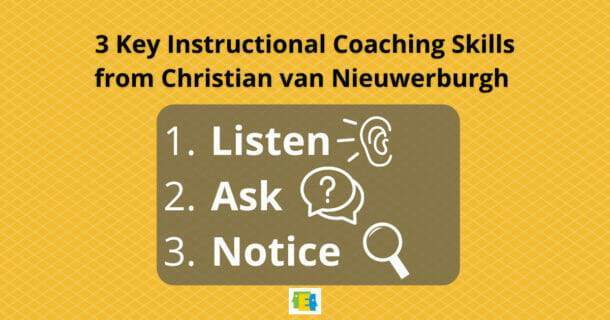3 Skills and a Conversational Framework: What You Need for Better Instructional Coaching
Supporting teachers’ professional development and classroom effectiveness is directly connected to positive student outcomes. And instructional coaching is key to teacher growth.
According to author of multiple coaching books, Christian van Nieuwerburgh,
“Coaching is about creating ideal environments in which good learning can take place.”
But how do instructional coaches create that learning environment for teachers?
Instructional coaching relies on several key skills, such as asking thoughtful questions, and sticking to a conversational framework.
In this #PLtogether Lounge Talk, coaching and positive psychology professor Christian van Nieuwerburgh talked with Edthena founder and CEO Adam Geller.
The two talked about best practices of instructional coaching and what it means for a teacher coach to effectively support teachers.
Check out the full conversation above or continue reading for highlights of 3 key skills and a conversational framework for instructional coaches.
3 key coaching skills: listening, asking, noticing
Christian van Nieuwerburgh outlines 3 skills that must be included in strong instructional coaching.
1. Listening… in a way that encourages thinking and makes the coachee feel valued.
Two methods of active listening are paraphrasing and summarizing, which allow the coach to play back what they’ve heard. This provides evidence to the person being coached that the coach has been listening.
2. Asking questions… that provoke new thinking.
Christian’s organization Growth Coaching International provides this resource for asking more thoughtful questions: The 3 C’s of Questioning
3. Noticing… what’s happening between the coach and the teacher coachee.
For example, Christian suggested noticing things like: “The person I’m coaching seems to be a little bit guarded or I need to notice that the person I’m coaching doesn’t really like to talk about this topic or I need to notice that they’ve got great strengths in something.”

A conversational framework for instructional coaching conversations
“Coaching is a conversation but it’s not just a conversation. Coaching is actually a managed conversation,” said Christian.
That’s why instructional coaches should use a conversational framework, as a way to manage that process.
Christian shared elements of an effective conversational framework:
Starting with a teacher goal
Christian explained, “Know the desired outcome… What is it that’s motivating [the teacher] to have a conversation about change?”
Teachers should be setting this goal through their own reflections.
Assessing the current classroom reality for the teacher and identifying the gap to their goal.
“We need to see the gap between where [the teacher] wants to be and where [they] are now.”
Considering ideas for making progress toward that gap.
“It’s important that all of these options come from the person we’re coaching because these are the people who are gonna be doing the work. It’s very helpful for them to generate their own ideas,” underscored Christian.
Committing to one small step is the final but key thing.
For example, an instructional coach could pose to a teacher: “We’ve talked about all of these different options… Which one do you think is going to be most successful and what are you going to do before the next time we meet?”
Build a foundation of coaching skills
Instructional coaching is important but complex work.
For teachers to grow, they must be supported by coaches who can listen and ask questions that promote thinking, notice the nuances of a teacher’s needs, and manage a coaching conversation effectively.
Use the resources and best practices from Christian van Nieuwerburgh to strengthen your instructional coaching.
For more from Christian van Niewerburgh, check out more of our conversations with him about instructional coaching.

